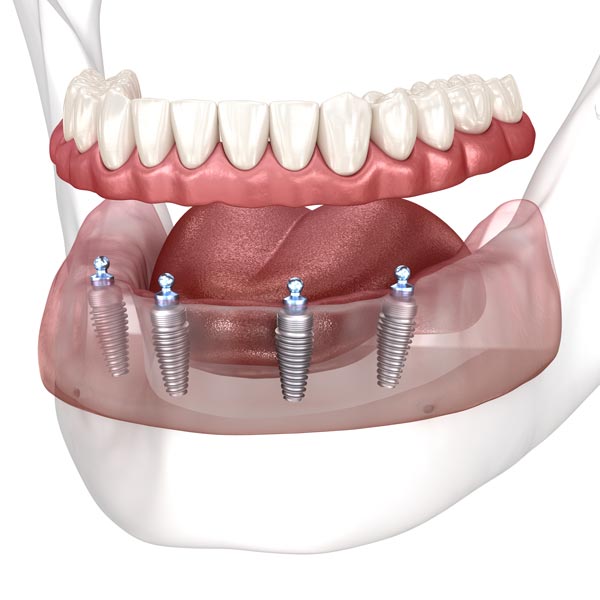Patient Forms
Dental Implants
Dental Implants Specialist in Sanford
Restore Your Smile with Comfort, Precision & Confidence
If you're missing one or more teeth, dental implants offer a permanent, natural-looking solution that restores function, improves your appearance, and protects your oral health. At Sanford Dental Excellence, we go beyond simply placing implants—we provide a personalized, anxiety-free experience with award-winning care every step of the way.
"As always, the cleaning of my implants and the prosthetics was quick, friendly, and efficient. I actually enjoy visiting the practice. They saved my mouth after another surgeon throughly botched two surgeries! I trust them completely!"

What are Dental Implants
Dental implants are small titanium posts surgically placed into the jawbone, acting as artificial roots for replacement teeth. Once the implant fuses with the bone, it supports a custom-made crown, bridge, or denture—offering unmatched stability and aesthetics.
Benefits of Dental Implants
- Look, feel, and function like natural teeth
- Prevent bone loss and preserve facial structure
- Allow you to eat, speak, and smile with confidence
- No slipping or discomfort, unlike traditional dentures
- Long-lasting, often permanent solution with proper care

Why Choose Sanford Dental Excellence for Dental Implants?
Choosing the right dental provider for your implants is just as important as the procedure itself. Here’s what makes Sanford Dental Excellence the trusted choice for implant dentistry in Central Florida:
- IV Sedation for a Pain-Free Experience
Dental anxiety is common - especially for surgical procedures like implants. That's why we offer IV sedation for nearly all implant treatments, so you can stay completely relaxed and comfortable from start to finish. - Comprehensive Implant Care in One Location
From initial consultation and 3D imaging to placement and restoration, all procedures are performed in-house by Dr. George Mitrogogos and his experienced, highly-rated team. No need to visit multiple specialists - you'll be cared for by the same trusted professionals every time at our private dental practice. - Award-Winning, Patient-First Practice
Sanford Dental Excellence has been named Best Sanford Dentist six years in a row (2018-2024), a reflection of our commitment to exceptional outcomes and compassionate care. We treat every patient like family, not a number and that is reflected in our 4.9 Google Rating with over 850 reviews.
- Advanced Technology for Better Results
We use the latest dental technology including 3D planned, custom made surgical guides for precise implant placement to reduce the risk for implant failure, cone beam CT scans for precise diagnostics, intraoral scanners for more accurate impressions (no messy molds), and computer-guided implant placement for safety and predictability.
- Special Expertise in Mature Smiles
Implants are especially popular among adults facing age-related tooth loss. We specialize in implant-supported dentures and full-mouth restorations, designed to improve the quality of life for mature patients.
Private Practice with a Dedicated Team
Our private, non-corporate office provides a cozy, boutique environment where you'll always be greeted by name. With a low-turnover, highly-trained team, you'll enjoy continuity of care and personalized attention that's rare in larger practices.
Get Started on Transforming Your Smile
Fill out the form to schedule your free dental implant consultation.
Our privately-owned dental practice is conveniently located in Sanford immediately off I-4 on state road 46.

Types of Dental Implant Solutions We Offer
Whether you're missing one tooth or need a full-arch restoration, we offer implant solutions tailored to your needs:
- Single Tooth Implants
Replace a single missing tooth with an implant and custom crown for a seamless, natural look. - Implant Bridges
Secure multiple missing teeth with a fixed bridge supported by two or more implants. - Implant-Supported Dentures
Upgrade from loose, uncomfortable dentures to a secure, snap-in solution with implant retention. - Fountain of Youth Dentures with Implants
This advanced denture option restores volume to the face while providing the stability and comfort of implants - helping you look younger and feel more confident.

What to Expect: Your Dental Implant Journey
- Step 1: Free Consultation
We begin with a thorough exam, digital imaging, and a discussion of your goals. We'll explain your options and determine if you're a good candidate for dental implants. - Step 2: Sedation & Implant Placement
During the procedure, we'll keep you comfortable with IV sedation while the implants are placed with precision using advanced 3D technology. - Step 3: Healing & Restoration
After a brief healing period, we'll place your final restoration - crown, bridge, or denture - customized to fit your smile and bite perfectly. - Step 4: Enjoy Your New Smile
With your implants fully integrated and restored, you'll enjoy a confident, functional smile that lasts foro years to come.
Real Patients, Real Results
Hundreds of patients have transformed their lives at Sanford Dental Excellence with the help of our dental implants. Our 5-star reviews speak to our professionalism, caring approach, and life-changing smile results.
"Not enough space to share how much I appreciate Sanford Dental Excellence!
From the beginning, when they saved from the mess made by a different dentist to my last visit, (the start of a new implant process), I have had nothing but positive experiences. Happy, qualified staff, both administrative and dental, excellent service, teeth that either fit the first time or get immediate attention and adjustments, reasonable prices, and information.
It is so comforting when folks are willing to explain what's going to happen and what they are doing while in process. They don't make you feel stupid, they make you feel cared about. Maybe that's the bottom line: I know that everyone there cares about me.
One last comment: how often do you go to a dentist and find folks either briefly waiting their turn or coming out of a chair... Laughing and happy! I mean: really? Try Sanford Dental Excellence and see for yourself!"
- Georgeanna Kiser

Today I went to Sanford Dental Excellence because I need a dental implants, and I have a great experience, all the stuff was very efficient and friendly, Tracy was very detail and professional, I've never had such a thorough dental exam, I had a complete examination of my teeth, including x-rays, bone density of the bone where the implant will be. They examined my gums and took photographs of each tooth then Dr Mitrogogos came to give me details about the implants. At the end, they gave me a detailed estimate of the treatment. I liked that everything was clear and very professional, and all of this was free of charge. Oh, and when I said goodbye, they gave me a little bag with gifts They are a family dentist who inspires a lot of confidence, unlike the large dental chains where you don't know exactly who your dentist will be. They gave me very personalized attention even without knowing if I will have my dental treatment with them, it is dental excellence as their logo says I recommend them 💯
- Maria Llanos
Transform Your Smile
Ready to explore the possibilities of dental implants? Discover why so many Central Florida residents choose Sanford Dental Excellence for their implant needs.
Call now or request your FREE consultation online. Let us help you smile with confidence—comfortably, safely, and beautifully.
